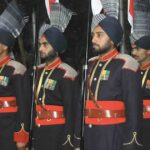SOURCE: Anadolu Agency

Pakistan Wednesday urged the world terror financing watchdog — the Financial Action Task Force (FATF) — to block illegal funding for an Indian political party it accuses of involvement in terrorism.
In a statement, Shehryar Afridi, chair of the Pakistani Parliament’s Kashmir Committee, accused the Rashtriya Swayamsevak Sangh (RSS) of “terrorist activities funded by the Indian diaspora”.
Expressing deep concern, Afridi and Sardar Attique Khan, former prime minister of Pakistan-administered Kashmir (Azad Jammu and Kashmir), said the RSS has been “receiving funding from the Indian diaspora based in dozens of countries across the globe.”
In a meeting held at Pakistan’s parliament, the two leaders urged the UN, the FATF and other financial institutions to take “cognizance of the situation and follow it up with immediate action to block these illegal transactions as RSS has been using these funds to kill and torture religious minorities in mainland India as well Indian Illegally Occupied Jammu and Kashmir [IIOJK].”
“The RSS terrorists have carried out terrorist attacks across India killing Muslims, including in 2006 Malegaon blasts, Mecca Masjid bombing in Hyderabad, Samjhauta Express bombings and the Ajmer Sharif Dargah blasts,” they said.
The RSS gave birth to India’s ruling party, the Bharatiya Janata Party (BJP).
“The RSS is receiving funding from Indian diaspora based in various countries and Indian Consulates are facilitating the transfer of funding to the terrorist organization that is killing and lynching Muslims in India and Kashmir and carrying a Hindu supremacist ideology,” said Afridi and Khan, expressing “shock over the silence of FATF over illegal and illicit transactions to the RSS.”
“The global financial watchdog, Financial Action Task Force, must take measures to combat money-laundering and terror-financing to the Hindu terror outfits,” the two leaders demanded.
Afridi reiterated that the people and leadership of Pakistan are “committed to the cause of Kashmir and would remain steadfast till the dispute is resolved according to the aspirations of the Kashmiri people.”
“The Kashmir dispute is a very complex issue and Pakistan has to focus on narrative-building to put facts before the world,” said Khan, the former premier of Azad Kashmir.
Urging Afridi to engage with the Kashmiri and Pakistani diaspora across the globe, Khan called on diaspora groups to spread awareness in the West over the Kashmir dispute.
In August 2019, India imposed a lockdown on Jammu and Kashmir, a move widely decried by human rights groups as well as the global Islamic community.
Jammu and Kashmir is held by India and Pakistan in parts and claimed by both in full. A small sliver of Kashmir is also held by China.
Since they were partitioned in 1947, the two countries have fought three wars — in 1948, 1965 and 1971 — including two over Kashmir.
Some Kashmiri groups in Jammu and Kashmir have been fighting against Indian rule for independence or unification with neighboring Pakistan.
According to several human rights groups, thousands of people have been killed in the conflict in the region since 1989.






